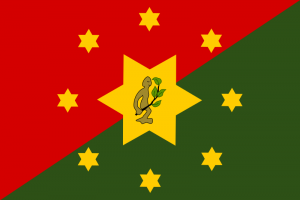Language/Agarabi/Grammar/How-to-Use-Be
Hi Agarabi learners! 😊
In this lesson, we'll be exploring how to use the verb "be" in Agarabi. This verb is essential in constructing sentences, so it's important that we understand how it works to communicate effectively in Agarabi. By the end of this lesson, you'll be able to use "be" to form simple sentences, ask questions, and use it in different tenses. Let's get started!
Don't hesitate to look into these other pages after completing this lesson: Negation & Conditional Mood.
Basic Usage[edit | edit source]
"Be" is an irregular verb, and it's used as both the main verb and auxiliaries. The Agarabi word for "be" is "koowa". The verb "koowa" is different from other verbs because it doesn't change according to whether the subject is singular or plural.
Here's how to use "koowa" in simple present tense:
| Agarabi | Pronunciation | English |
|---|---|---|
| koowa taan | /'kowwɑ tän/ | I am |
| koowa rootoo | /'kowwɑ rɔ:tʊ/ | You are (singular) |
| koowa tooṭoo | /'kowwɑ tɔ:tʊ/ | He/She/It is |
| koowa raṭoo | /'kowwɑ rɑ:tʊ/ | We are |
| koowa rukšoo | /'kowwɑ rʊkʃʊ/ | You are (plural) |
| koowa tu-luṭoo | /'kowwɑ tu:lʊtʊ/ | They are |
Let's have a dialogue to see these conjugations in context:
- Person 1: koowa taan. ("I am.")
- Person 2: koowa rootoo. ("You are.")
You can also use "koowa" in the negative form by adding "ma" before it. For instance:
| Agarabi | Pronunciation | English |
|---|---|---|
| ma koowa taan | /mɑ 'kowwɑ tän/ | I am not |
| ma koowa rootoo | /mɑ 'kowwɑ rɔ:tʊ/ | You are not (singular) |
| ma koowa tooṭoo | /mɑ 'kowwɑ tɔ:tʊ/ | He/She/It is not |
| ma koowa raṭoo | /mɑ 'kowwɑ rɑ:tʊ/ | We are not |
| ma koowa rukšoo | /mɑ 'kowwɑ rʊkʃʊ/ | You are not (plural) |
| ma koowa tu-luṭoo | /mɑ 'kowwɑ tu:lʊtʊ/ | They are not |
Here's a dialogue to illustrate:
- Person 1: ma koowa tooṭoo. ("He/She/It is not.")
- Person 2: ma koowa rukšoo. ("You are not (plural).")
Questions[edit | edit source]
To ask a question in Agarabi, you simply need to swap the verb "koowa" with the subject of the sentence. For instance, "koowa tooṭoo" ("He/She/It is") becomes "Tooṭoo koowa?" ("Is he/she/it?").
Let's demonstrate with an example:
- Person 1: koowa raṭoo. ("We are.")
- Person 2: Raṭoo koowa? ("Are we?")
Note that you can also use question words like "who," "what," "when," "where," and "why" to form more complex questions.
Tenses[edit | edit source]
"Koowa" can be used in different tenses to describe past, present, or future events. Here are some examples of how to use "koowa" in other tenses:
Past tense[edit | edit source]
The past tense is formed by adding "la" after "koowa".
| Agarabi | Pronunciation | English |
|---|---|---|
| koowa la taan | /'kowwɑ lä tän/ | I was |
| koowa la rootoo | /'kowwɑ lä rɔ:tʊ/ | You were (singular) |
| koowa la tooṭoo | /'kowwɑ lä tɔ:tʊ/ | He/She/It was |
| koowa la raṭoo | /'kowwɑ lä rɑ:tʊ/ | We were |
| koowa la rukšoo | /'kowwɑ lä rʊkʃʊ/ | You were (plural) |
| koowa la tu-luṭoo | /'kowwɑ lä tu:lʊtʊ/ | They were |
Let's use an example in a dialogue:
- Person 1: koowa la raṭoo. ("We were.")
- Person 2: raṭoo koowa la? ("Were we?")
Future tense[edit | edit source]
The future tense is formed by adding "la" and "gu" after "koowa".
| Agarabi | Pronunciation | English |
|---|---|---|
| koowa la gu laan | /'kowwɑ lä gü lään/ | I will be |
| koowa la gu rotoo | /'kowwɑ lä gü rɔ:tʊ/ | You will be (singular) |
| koowa la gu tooṭoo | /'kowwɑ lä gü tɔ:tʊ/ | He/She/It will be |
| koowa la gu raṭoo | /'kowwɑ lä gü rɑ:tʊ/ | We will be |
| koowa la gu rukšoo | /'kowwɑ lä gü rʊkʃʊ/ | You will be (plural) |
| koowa la gu tu-luṭoo | /'kowwɑ lä gü tu:lʊtʊ/ | They will be |
Here's an example dialogue:
- Person 1: koowa la gu tooṭoo. ("He/She/It will be.")
- Person 2: tooṭoo koowa la gu? ("Will he/she/it be?")
Present continuous tense[edit | edit source]
Present continuous, also known as present progressive, is formed by adding "i" after "koowa".
| Agarabi | Pronunciation | English |
|---|---|---|
| koowa itun taan | /'kowwɑ itun tän/ | I am being |
| koowa itun rootoo | /'kowwɑ itun rɔ:tʊ/ | You are being (singular) |
| koowa itun tooṭoo | /'kowwɑ itun tɔ:tʊ/ | He/She/It is being |
| koowa itun raṭoo | /'kowwɑ itun rɑ:tʊ/ | We are being |
| koowa itun rukšoo | /'kowwɑ itun rʊkʃʊ/ | You are being (plural) |
| koowa itun tu-luṭoo | /'kowwɑ itun tu:lʊtʊ/ | They are being |
For instance, you can say:
- Person 1: koowa itun raṭoo. ("We are being.")
- Person 2: raṭoo koowa itun? ("Are we being?")
You can also use negative forms of present continuous tense.
Interesting Facts[edit | edit source]
Here are some interesting facts about the Agarabi language:
- Agarabi is spoken by over five million people in the world.
- Agarabi is classified as a Niger-Congo language, which means it belongs to a group of languages spoken largely in West Africa.
- Agarabi has no grammatical gender.
- In Agarabi, you can form a plural by adding the prefix "ma" or "bo" to a word.
To improve your Agarabi Grammar, you can also use the Polyglot Club website. Find native speakers and ask them any questions!
➡ If you have any questions, please ask them in the comments section below.
➡ Feel free to edit this wiki page if you think it can be improved. 😎
Other Lessons[edit | edit source]

